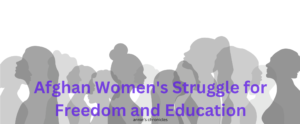Afghan Women's Struggle for Freedom and Education
September 15th marks a somber milestone. Three years ago, Afghan women and girls were officially barred from attending school, a decision that echoed far beyond the walls of classrooms, stripping them not only of their right to education but of their futures. Today, they find themselves denied the most basic rights such as education, employment, freedom of movement, and political participation, rendering them virtually invisible in a country they’ve fought so hard to be seen in.
Afghanistan now ranks last on the Women, Peace, and Security Index, a chilling statistic that captures the deep-seated violence and systemic oppression Afghan women face daily. Yet, these numbers cannot fully convey the pain of millions of girls who, for the past three years, have been locked out of the opportunities to learn, grow, and pursue their dreams. They’ve been erased from the workforce, forced to stay at home, and isolated from any form of public life.
Backstory
The Taliban’s return to power in August 2021 brought a wave of oppressive measures, swiftly rolling back hard-won rights for Afghan women. In a matter of weeks, girls were forced to stop attending secondary schools and universities. Women were removed from government positions and other sectors of public life, their roles as teachers, lawyers, journalists, and doctors suddenly deemed unfit.
In a country where women had fought for years to carve out a space for themselves, the devastation was palpable. In a single stroke, generations of progress were wiped away, leaving Afghan women in a suffocating reality where their voices are silenced, their presence erased.
Education – More than Just a Right
The right to education is not just about attending school. It’s about empowerment, choice, and freedom. Education allows girls to envision a future where they are independent, where they can make decisions about their lives, and where they can contribute to their communities. For Afghan women and girls, the right to an education meant breaking cycles of poverty, speaking up for themselves, and gaining the tools to challenge the very systems that sought to oppress them. To be denied this right is to be denied the power to hope and the ability to dream beyond the four walls of their homes.
Imagine being a young girl with aspirations of becoming a doctor, a teacher, or a leader in your community, only to wake up one day and be told that those dreams are no longer valid. That your only role now is to stay at home, unseen and unheard. For Afghan women, this is not just a loss of education—it’s a loss of identity, agency, and the right to exist freely in their own country.
Silent Heroes
Despite these oppressive conditions, Afghan women’s rights defenders continue to fight—though their struggle is marked by a chilling silence. These women are at the front lines, risking their lives to protest, document, and resist the system that seeks to oppress them. But their courage comes at a steep price. Many have been forcibly disappeared, detained, and even tortured by authorities for daring to speak out. Their names and faces may never make headlines, but they are the silent heroes of this ongoing struggle.
Yet, their work is far from easy. Under constant threat, they continue to advocate for the rights of Afghan women, knowing full well the dangers they face. These defenders are not just fighting for education or employment, they’re fighting for the right to exist as equals, to live without fear, and to reclaim the dignity that has been stolen from them.
Global Responsibility
While the situation in Afghanistan feels distant for many, it’s crucial to remember that this is not just an Afghan issue, it’s a global one. The world cannot stand by as millions of women and girls are erased from society. We owe it to them to continue advocating for their rights, to amplify their voices, and to ensure that their stories are not forgotten.
The international community must continue to put pressure on the Taliban to reverse these draconian policies and restore the rights of Afghan women. It is unacceptable that, in 2024, we are still fighting for basic human rights like education, employment, and freedom of movement for half of Afghanistan’s population.
As we mark this third anniversary, let us not only remember the losses but also honor the resilience and strength of Afghan women. They may be denied their rights, but their spirits remain unbroken. Every day, they fight in ways big and small, refusing to be silenced, refusing to be erased.
Now, more than ever, they need the world’s attention and support. We cannot allow their struggle to be ignored or forgotten. Because their fight is not just for Afghan women, it’s for the rights of women everywhere.

